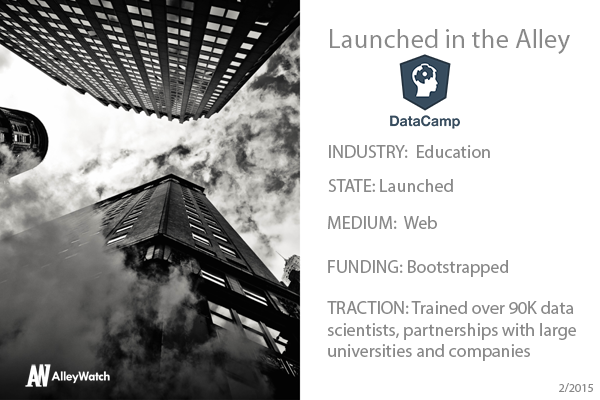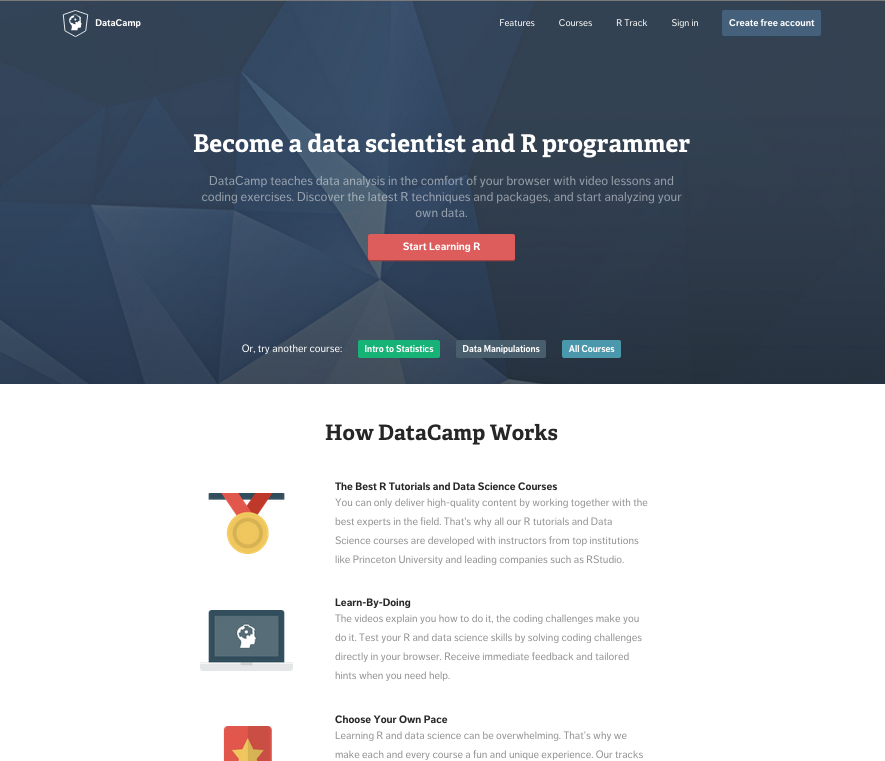Data scientists and analysts are in high demand and short supply right now – and the gap is growing by leaps and bounds. We personally can’t break it down for you statistically, but DataCamp cofounder and CEO (and PhD) Jonathan Cornelissen certainly could. Once he crunched the numbers, the solution was clear:an online data science curriculum that uses video lessons and interactive coding challenges to train the next crop of data scientists. The idea was always for the Belgium-based company to established roots in NYC, and what better place to start than at Techstars NYC?
Conielissen tells us more about the company, its focus on one of the hottest sectors in tech, and some of the benefits they’ve already enjoyed by simply being part of Techstars.
Tell us about the decision to apply for the Techstars NYC.
We were in contact with Alex Iskold (Techstars MD) before the application process opened. In these conversations, it quickly became clear that attending Techstars would be a very valuable experience for DataCamp. Being from Belgium originally, we wanted to move the company to the US, and Techstars seemed the perfect jumpstart to building a network in the US.
Tell us about your service.
DataCamp is an online Data Science school that uses video lessons and coding challenges. In its first year, DataCamp trained over 92,000 data scientists who completed over 3.7 million exercises. DataCamp offers hands-on data science courses by leveraging partnerships with best-in-class academic institutions (Princeton, Duke and University of Washington) and companies like Revolution Analytics(recently acquired by Microsoft) and RStudio.
How is it different?
We’re the first online learning platform that focuses on building the best learning experience specifically for Data Science.
What market are you attacking and how big is it?
We target all aspiring and professional data scientists. McKinsey & Company estimates there will be a shortage of 190k data scientists and 1.5 million data-savvy managers by 2018 in the US alone. We are convincedthat that’s just the tip of the iceberg. Companies in all industries are going through a transformation and figuring out how to use data to their advantage. A large part of that exercise will boil down to retraining their existing work force. DataCamp wants to be the company that provides the training to help companies in all industries with that transition.
What is the business model?
DataCamp offers free beginners courses and we charge a monthly subscription fee for access to our premium courses.
Why did you embark upon this venture?
I was teaching statistics and statistical programming two years ago, while working towards my PhD, and I was looking for an engaging and scalable way to teach students (something similar to Codecademy, CodeSchool, Treehouse… but for statistics/data science). Surprisingly, it turned out no one was building a platform that teaches data science according to the “learning-by-doing” philosophy. Realizing there clearly was a market opportunity, we decided to build just that: an effective learning platform that teaches data science according to the learning-by-doing philosophy, and trains professional and aspiring data scientists in a scalable way.
Do you think data analysts will be as omnipresent in most businesses as areaccountants and HR?
Of course! It’s happening right now. Just like every company has an “IT person” or IT department, every company will have data analysts or a data science department. It’s the obvious next step. Furthermore, we see that many of the professionals in our user base are not full-time data analysts, but take the courses to become data savvy so that they can make data-driven decisions. Having some level of data science literacy will become an important asset for any type of function, whether it is in technology, finance, pharma or marketing.
What are the milestones that you plan to achieve within six months?
We’ll launch our first “R track” this week. It takes a complete beginner in R and teaches him or her all the skills to become an intermediate R programmer. We’ve partnered with experienced R developers and leading companies in the space, like RStudio and Revolution Analytics, to create the track. Find more information here!
If you could be put in touch with one investor in the New York community who would it be and why?
We’d like to keep our investor targets confidential 😉 have already met several great investors, thanks to Techstars.
What are you looking forward to doing the most in NYC outside of work?
Outside of work?
Are the winters better in Belgium or in NYC?
They’re similar, actually. New York is a little bit colder, but that’s okay. As we spent last winter in Santiago, Chile, we had summer twice last year :-).




